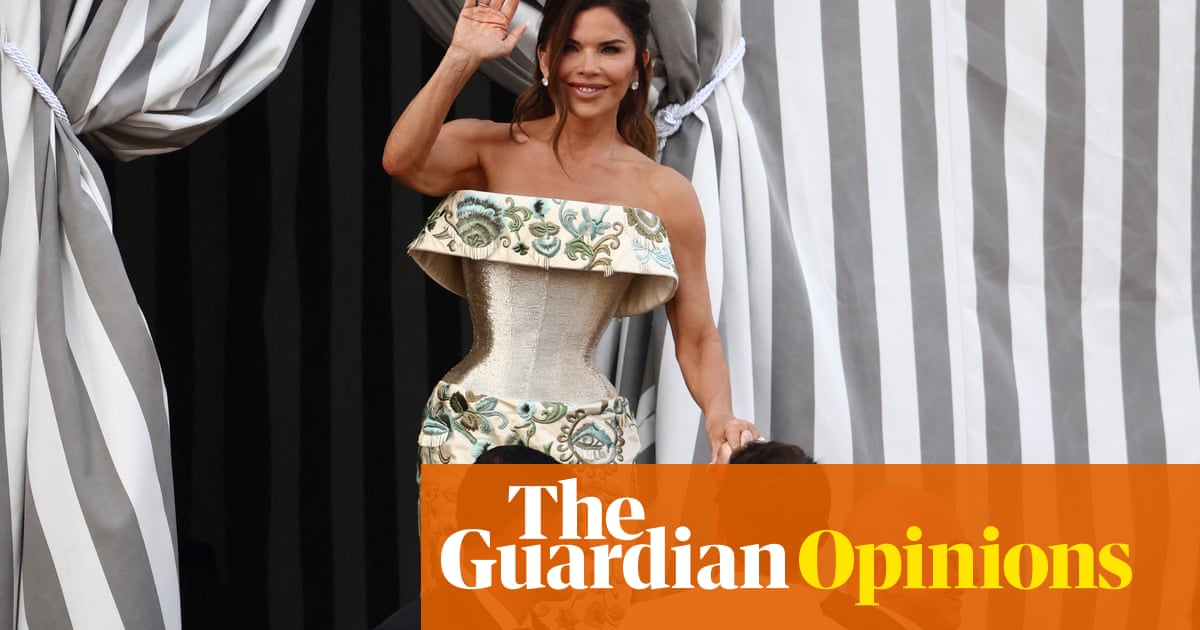How neat thatAnna Wintour’s resignationas editor-in-chief of American Vogue should occur bang in the middle of Lauren Sánchez and Jeff Bezos’s wedding extravaganza in Venice. Top takeout? Anna’s revolution is over. She lost. Not personally, of course – she accrued significant riches herself, and her name is literallyhewn into stoneover a chunk of the Metropolitan Museum of Art in New York. Just don’t call her Ozymandias! But the things she represented are over, and nothing illustrates it in quite such withering fashion as the gathering on the Grand Canal of Instagram’s apex predators.
Don’t worry – this isn’t going to be another article over-egging the fact that someone has unfurled some protest banner or something on a Venetian church. Very little needs refreshing quite as desperately as the eat-the-rich genre, which has started to feel even smugger than the super-rich themselves. I think we can all live without people who positively adored it when George and Amal Clooney took over Venice fortheir 2014 weddingnow wetting their pants when the Bezos-Sánchezes do it.
Besides, these days the super-rich behave more like revolutionaries than those supposedly committed to overthrowing them. Listen, I don’t love the result – but you can’t deny they’ve got on a lot better with ripping everything up than their opposition.
Anyway: the revolutionary style. British Vogue recently declared that “chic is dead” – a comment that would probably have had to have been approved up the food chain in New York by the famously controlling Wintour. And certainly, someone as – how to put this? –aesthetically sensitiveas Anna might have found it difficult this week to watch aseries of Kardashianstramp down a series ofVenetian jettiesin a series of$10,000 bras. And yet, in her twilight professional years – and make no mistake, we have been living through them – Wintour ended up courting all these figures. Kim Kardashian was eventually admitted to Wintour’s Met Gala in tacit recognition of her then-unparalleled ability to create moments on the internet, a medium that had completely eaten magazines. Sánchez was“helped” by Wintourwith her outfit choice for her own Met debut, as well as given a Vogue photospread.
All of that read like Wintour reluctantly having to attach herself to a type she’d spent such ferociously studious decades keeping out. They were the way the wind was blowing, and it was better to be borne along by it than blown into irrelevance. But that in itself was the writing on the wall: Wintour was no longer making the weather. It is said she “advised” Sánchez in some capacity on her clothes for the current wedding celebrations. Maybe the only thing worse than helping Lauren with her outfits is not helping Lauren with her outfits.
And yet, if the second Mrs Bezos wants the clothes, she just buys them. Quick word on the Sánchez aesthetic: you might have heard of trends such as stealth wealth, quiet luxury, whatever. Forget about those. Lauren wants to look really rich and really sexy and like she’s having a really good time, all of the time. In Venice,in space, at the presidential inauguration. And if you’re even remotely tempted to comment that, actually, you don’t find that type of look sexy, then you’ve missed the absolutely key thing about Lauren Sánchez, and what makes her hilariously, invigoratingly iconoclastic in contrast with the billionaires’ wives of yore. She literallydoes not carewhat anyone else thinks. Like, not at all. Sorry!
Her entire look says, “I am wearing this and I don’t care what you think”, whereas Wintour presided over a world where rich women’s looks said, “I am wearing this and I do care what you think.” Back in the day, someone passing from mere riches to mega-riches had a minefield to navigate, and knew it. The mines were mostly laid by women who’d got there about 10 minutes before them. Every single parvenue society queen felt this, and some even wrote it down. Barbara Amiel’smemoir describesthe milieu she moved into with her marriage to Conrad Black in excruciatingly absurd detail. Here she is, a billionaire’s wife, yet gripped by constant social anxiety, forever agonising that she’d worn her best rocks to an event that actually called for “patio jewellery” (necklaces $1m or under). She is constantly finding herself looking too much or too little. “You don’t wear white,” a caring society assassin tells her about the colour of her shoes. “It’s for sales girls.” As Amiel reflected: “I was consumed by fear of not doing it right.”
In order for there to be people worried about getting it wrong, there had to be people decreeing what was right. And for a very long time indeed, the empress of those people was Wintour. She was a rarefied being who knew better than you, who had the power to help or hinder your passage even further up society’s Mount Olympus, and who acted as a trusted and feared gatekeeper to a world in which you were, in some ways, still the rube you started out as.
Even figures as recent in the timeline as Kim Kardashian kept the old ways and bent the knee to Wintour, but maybe Kim was the last.
Things go out of style – perhaps including style itself. Certainly capital-S style, as decreed by Wintour herself. If there’s afin-de-sièclevibe hanging over the Bezos wedding, it’s Anna’ssiècleit’s thefinof. The happy couple and their tribe have the distinct air of having only just got started.
Marina Hyde is a Guardian columnist
